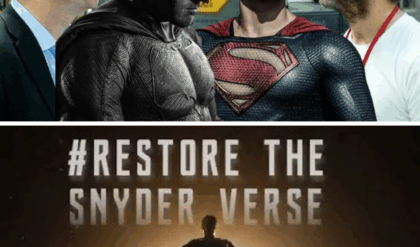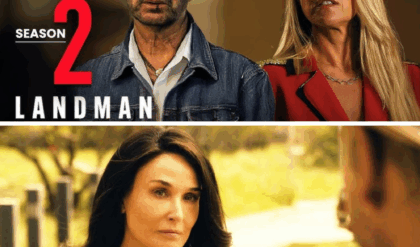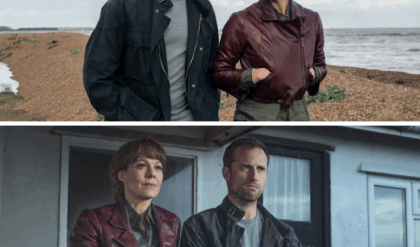The sun-drenched stretch of Hollywood Boulevard, where brass stars gleam like scattered constellations under the relentless California sky, has long served as a monument to the immortals of cinema—a sidewalk pantheon etched with the names of legends who bent the arc of entertainment history. On November 12, 2025, the Hollywood Chamber of Commerce ignited a spark of collective remembrance, announcing that Chadwick Boseman, the stoic king of Wakanda whose regal presence redefined heroism on screen, will be posthumously enshrined with the 2,828th star on the Walk of Fame. The ceremony, set for Thursday, November 20 at 11:30 a.m. PT outside 6904 Hollywood Blvd., arrives like a delayed thunderclap, nearly two years after Boseman’s selection as a 2023 honoree was first revealed. Scheduling shifts and the quiet dignity of grief pushed the unveiling to this poignant milestone—five years to the month since his passing on August 28, 2020, at age 43 after a private four-year battle with colon cancer. As the world prepares to gather in tribute, with director Ryan Coogler and actress Viola Davis set to speak and Boseman’s widow, Simone Ledward-Boseman, accepting on his behalf, the event transcends mere brass and terrazzo. It’s a resurrection of spirit, a defiant “Wakanda Forever” etched into the pavement, reminding us that true kings don’t fade—they endure, their legacy pulsing through the hearts of millions who once chanted his name in darkened theaters.
Boseman’s journey to this star was never a straight path, but a mosaic of quiet triumphs and seismic impacts, forged in the fires of determination and the unyielding pursuit of stories that mattered. Born November 29, 1977, in Anderson, South Carolina, to a homemaker mother and an entrepreneur father, young Chadwick was a voracious reader and budding playwright, channeling his energies into Howard University’s theater program where he honed a craft that blended intellectual rigor with raw emotional depth. Fresh out of college, he dove into the trenches of New York’s indie scene, penning scripts and scraping by on bit parts, but it was his breakout in 2013’s 42—embodying baseball icon Jackie Robinson with a fire that crackled through every stolen base and defiant stare—that announced him as a force. Robinson wasn’t just a role; it was a mantle, Boseman infusing the civil rights pioneer’s grace under fire with a palpable urgency that echoed the struggles of his own era. “He didn’t just play Jackie—he became him,” co-star Harrison Ford later reflected, a sentiment that would define Boseman’s oeuvre: transformation not as mimicry, but as communion.
That alchemy propelled him into the biopic whirlwind of 2014’s Get On Up, where he channeled James Brown’s electrifying showmanship—the Godfather of Soul’s leg-weaving splits and mic-drop charisma rendered with a sweat-slicked authenticity that earned him a standing ovation at Sundance. Brown’s life was a gospel of grit, rising from poverty’s ashes to funk’s throne, and Boseman captured it with a swagger that blurred the line between performer and portrayer. By 2016, Hollywood beckoned with Marshall, a courtroom drama where he embodied a young Thurgood Marshall, the NAACP lawyer whose razor-sharp intellect dismantled segregation’s chains. Boseman’s Marshall wasn’t a saintly figurehead; he was a tactical warrior, his Southern drawl laced with indignation as he outfoxed bigoted foes in a pre-Brown v. Board world. Critics raved about the film’s taut procedural pulse, but it was Boseman’s ability to humanize history—making the abstract ache of injustice viscerally felt—that lingered.
Yet, it was the Marvel Cinematic Universe that catapulted Boseman into stratospheric iconography, a realm where capes gave way to cloaks woven from vibranium and ancestral lore. Introduced in 2016’s Captain America: Civil War as T’Challa, the Black Panther, he arrived not with bombast but poise—a prince navigating the rubble of Sokovia Accords with a moral compass forged in Wakanda’s isolationist ethos. Boseman’s T’Challa was no quippy Avenger; he was a philosopher-king, his baritone voice rumbling with the weight of a nation’s secrets, his panther suit a second skin that moved with predatory elegance. The 2018 solo outing, Black Panther, directed by Ryan Coogler, wasn’t merely a blockbuster—it was a cultural earthquake, grossing $1.34 billion worldwide and becoming the highest-grossing film by a Black director ever. Wakanda, that shimmering Afrofuturist utopia of high-tech spears and ritual combat, wasn’t backdrop; it was character, a defiant riposte to Hollywood’s historical erasure of African narratives. Boseman’s T’Challa anchored it all: a leader torn between tradition and progress, his rooftop confrontation with Michael B. Jordan’s Erik Killmonger a brotherly duel that sliced to the soul of diaspora identity. “Who are you without your crown?” Killmonger taunted, and Boseman’s response—a quiet fury tempered by empathy—resonated as a meditation on power’s price. The film snagged seven Oscar nods, including a historic Best Picture bid for a superhero flick, and Boseman’s presence infused it with a gravitas that elevated capes to crowns.
Even as Avengers: Infinity War and Endgame (2019) showcased T’Challa’s sacrificial stand against Thanos—his dusting a gut-punch that unified Wakanda’s warriors in a chorus of “Yibambe!”—Boseman was quietly battling his own Thanos: cancer, diagnosed in 2016 but never publicized, a secrecy that allowed him to pour every ounce into his work. His final screen role, in 2020’s Ma Rainey’s Black Bottom, was a posthumous revelation—a blues-drenched chamber piece where he played Levee, a ambitious trumpeter clashing with Denzel Washington’s Ma Rainey in a 1920s Pittsburgh recording session. Boseman’s Levee was a storm of suppressed rage, his devilish pact monologue a tour de force of shattered dreams and spiritual reckoning, earning him a Golden Globe, SAG Award, and posthumous Oscar and BAFTA nods. Directed by George C. Wolfe from August Wilson’s play, the film was a requiem for Black artistry’s exploitation, and Boseman’s raw vulnerability—eyes blazing with the fire of a man bargaining his soul—cemented his chameleon status. Off-screen, he was the philanthropist who funneled millions into arts programs for underserved youth, the mentor who championed emerging talents like John David Washington, the husband whose private joy with Simone—married in 2019—grounded his public ascent.

The announcement of Boseman’s star, first teased in June 2023 as part of the Walk of Fame’s Class of 2024 (a scheduling quirk born of pandemic backlogs and logistical grace), has simmered into this November crescendo, a tribute timed to honor the man without rushing the mourning. The ceremony, emceed by Hollywood Chamber CEO Steve Nissen and livestreamed on walkoffame.com, promises an intimate yet electric affair. Coogler, whose bond with Boseman was fraternal—forged over Fruitvale Station and deepened in Wakanda’s sun-baked sets—will speak to the director-actor alchemy that birthed a phenomenon. “Chadwick wasn’t just T’Challa; he was the heart of Wakanda,” Coogler shared in a 2022 tribute, his voice cracking over the finality of learning Boseman’s illness only after his death. Davis, Boseman’s Ma Rainey co-conspirator, brings a sister’s fire; their on-set rapport was legendary, two titans trading barbs and blues riffs, her Oscar-winning ferocity a mirror to his understated storm. Ledward-Boseman, the singer-songwriter whose quiet strength steadied him through treatments, will accept with poise, perhaps echoing the family’s ethos of purpose over pity. The star, in the Motion Pictures category, joins Marvel brethren like Chris Hemsworth and Scarlett Johansson, but Boseman’s placement feels singular—a beacon for the underrepresented icons who paved shadowed paths.
Social media, that digital agora of collective grief and glee, erupted like a vibranium explosion upon the news. #WakandaForever trended globally within hours, amassing over 2.5 million mentions by November 13, with fans flooding timelines with montages: Boseman’s T’Challa leaping from waterfalls, his Levee sneering at the devil’s deal, his Jackie Robinson stealing home under stadium lights. “Five years gone, but his light? Eternal. November 20 is for the king,” one viral post declared, racking up 150K likes and shares from stars like Lupita Nyong’o, who reposted with a simple “Yibambe.” X threads dissected his legacy’s layers—threads on his Howard days, where he directed student plays that tackled racial reckonings; memes blending Black Panther‘s ancestral plane with Walk of Fame glamour, captioned “Bast’s got a new address.” Black Twitter, ever the cultural vanguard, turned introspective: discussions on colon cancer’s silent toll in Black communities spiked, with users tagging awareness orgs Boseman quietly supported. Even skeptics, those jaded by Hollywood’s selective memory, softened: “He deserved this in ’20, but better late than never—Wakanda’s watching,” a poignant tweet read, echoing the shock of his unannounced passing that left studios scrambling to honor a ghost.
This star isn’t closure; it’s ignition—a spark reigniting conversations on representation’s fragility. In an industry where Black leads still comprise under 10% of tentpoles, Boseman’s imprint endures through Wakanda Forever‘s 2022 elegy, where Letitia Wright’s Shuri donned the mantle without recasting him, a choice Coogler defended as “honoring the ancestral plane.” His influence ripples in protégés like Jonathan Majors (pre-controversy Cyborg dreams) and the surge of Afrofuturist projects from The Woman King to Jordan Peele’s Nope. Philanthropically, the Chadwick Boseman Foundation for the Arts, launched by his family in 2021, has granted over $2 million to youth programs, embodying his mantra: “Storytelling is activism.” As November 20 dawns, Hollywood pauses—not in sorrow, but celebration. The Walk of Fame, that 1.3-mile testament to transience, gains a permanent sentinel: a star that doesn’t twinkle but burns, fierce and unyielding. Chadwick Boseman, the man who played gods and ghosts with equal grace, reminds us: heroes don’t die—they ascend. Wakanda forever? In brass and beyond, eternally.





